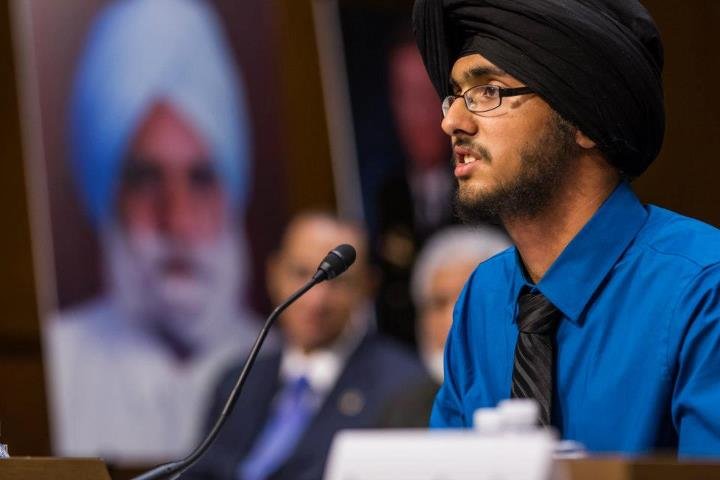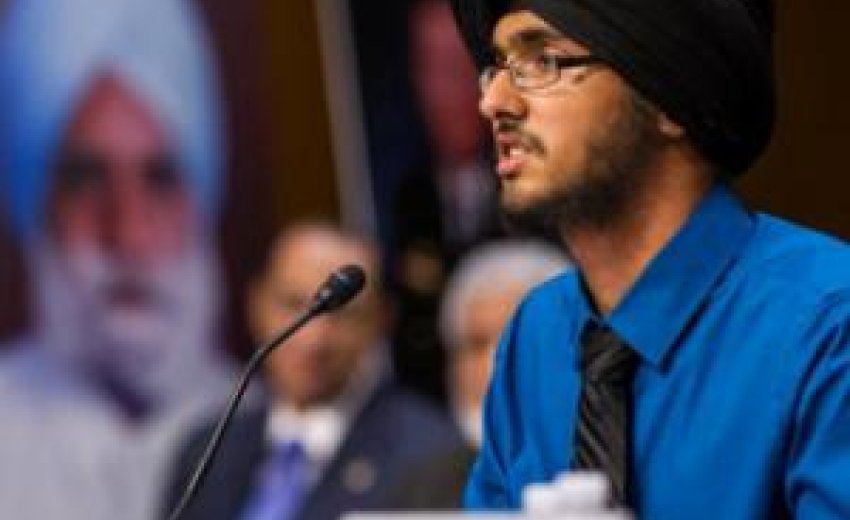
On Wednesday, as many had, I watched the webcast of the US Senate hearing “Hate Crimes and the Threat of Domestic Extremism” in which testimony was given by various government agencies and representatives of points of view in relation to hate violence. Among those providing testimony was Harpreet Singh Saini, one of the sons (his brother Kamaljit Singh Saini was also in attendance) of victim Paramjit Kaur, who was killed in the shooting rampage at the Gurdwara in Oak Creek, Wisconsin in early August.
You can watch the video of the yesterday’s hearing here.
One cannot discount the significance of this event, in which hate crimes with a focus on Sikh Americans is addressed at a Congressional hearing, and in which a variety of groups representing different faiths and communities were present. Adding to that significance is the brave testimony of a young Sikh who lost his mother only a few weeks before. Harpreet Singh’s testimony was by far the most salient and still echoes in my mind. I cannot do his words justice here and encourage any to read, or better, watch and listen (at the 55 minute mark) to his testimony in full. His words were powerful, heart-breaking, and touching.
Certainly, within the context of what happened in Oak Creek as the motivation, this hearing was a step forward in the national discussion on the issue of hate crimes and extremism within the Unites States. It was interesting to watch what was said, and what was not said by those who testified.
The hearing was convened by Senator Dick Durbin (D-IL), and his presence was made especially notable for much of first half of the hearing by the Committee seats that were vacant around him. As the Chair of the Senate Judiciary Committee’s Subcommittee on The Constitution, Civil Rights and Human Rights, he was the lone Senator in attendance for the first portion of the hearing, and as much as the testimony of official agencies, perhaps this was somewhat telling.
The Senator’s opening statements included a tribute to the victims of the Oak Creek massacre, and an encapsulation of the plague of hate crimes that have impacted America’s minority communities that was not limited to Sikhs, but those of other groups as well.
The first panel included testimony from representatives of the Department of Homeland Security (DHS), the US Department of Justice (DoJ), and the FBI. All three representatives provided accounts of what their agencies’ respective actions are in relation to hate violence and extremists groups. And, while each of the three representatives provided a historic description of what their organizations have done, none seemed to indicate what their steps are going forward — especially in light of the violence in Oak Creek. Senator Durbin asked relevant questions as to the capacities of these agencies to address hate violence, and of the issue around adding a “Sikh” category to the FBI hate crimes database, to which it was testified that there will be an update on that issue in October.
As Sikhs have been particular targets of hate crimes, it is positive news that movement on the issue of reporting these hate crimes as a separate category is finally happening. However, it must also be noted that this movement has come after many months of requests by Sikh groups (in particular, the Sikh Coalition and SALDEF), and also those made separately by 92 House Representatives in April and by 19 US Senators in August. After the Oak Creek shooting almost two months ago, other advocates also joined in this call for improved tracking of the number of hate crimes against Sikhs. With the long history of these requests and the recent focus on the issue, a commitment was made to report on a decision related to the data tracking next month. The amount of energy that has been required to make this incremental change in the FBI’s data collection process is surprising.
Also surprising was the revelation of how these agencies are understaffed to tackle domestic extremism. Senator Durbin’s questioning brought light to the lack of prioritization to domestic extremism and hate violence, and the testimony of Daryl Johnson — a former analyst with the DHS — during the panel’s second hearing revealed the lack of resources dedicated to tackle the issue.
Daryl Johnson’s testimony was particularly valuable, as he authored a 2009 study that was an alert about the rise of domestic extremists. Shortly after the Oak Creek shooting, an article in Wired magazine discussed Johnson’s 2009 report and how it was ignored:
But Johnson’s career took an unexpected turn in 2009, when an analysis he wrote on the rise of “Right-Wing Extremism” (.pdf) sparked a political controversy. Under pressure from conservatives, the Department of Homeland Security (DHS) repudiated Johnson’s paper — an especially bitter pill for him to swallow now that Wade Michael Page, a suspected white supremacist, killed at least six people at a Sikh temple in Oak Creek, Wisconsin. For Johnson, the shooting was a reminder that the government’s counterterrorism efforts are almost exclusively focused on al-Qaida, even as non-Islamist groups threaten Americans domestically.
It was during this second panel that Senators Herb Kohl (D-WI) and Richard Blumenthal (D-CT) joined and participated in the hearing, and this was a reassuring measure that there was at least some additional interest within the Subcommittee and the Senate on the issue of hate violence.
The testimony of James Jacobs, a professor of Constitutional Law and the Courts, provided an interesting observation of the opposing arguments against the application of hate crime law in the US system, citing redundancy in law and lack of resources in enforcement and corrections as justification to dismiss hate crime legislation. However, in his effort to explain that a hate crime is no different than any other in terms of consequence to the victim (and certainly, any loss of life to crime is extremely tragic regardless of motive), James Jacobs disregards the aspects of plea bargaining and early release that see hate crime perpetrators escape their full sentence, and he seemed unaware that a hate crime affects not only the primary victim, but also entire communities.
The real question, of course, is where things go from here. Will this hearing be an event in isolation, or does this signify an opening of a door in the policy world to address hate crimes and domestic extremism? With the lack of commitment by agencies to address this issue more forcefully, and with the support of a few Senators among the many, we are certainly still knocking on the door.
However, my sense is that the door has been opened, if just a little.
-----------------------------
Related Articles:
http://www.sikhnet.com/news/sikhs-testify-senate-hearing-hate-violence
http://www.sikhnet.com/news/senate-hearing-today-hate-crimes-goes-beyond-sikh-temple-shooting-guest-commentary
